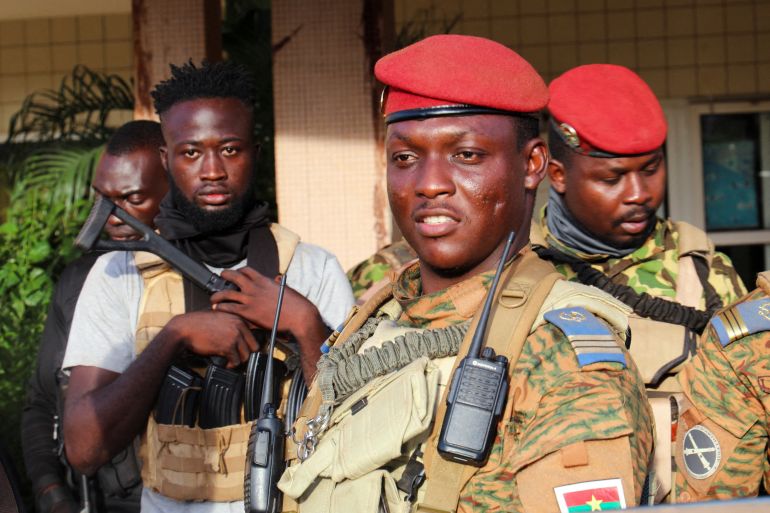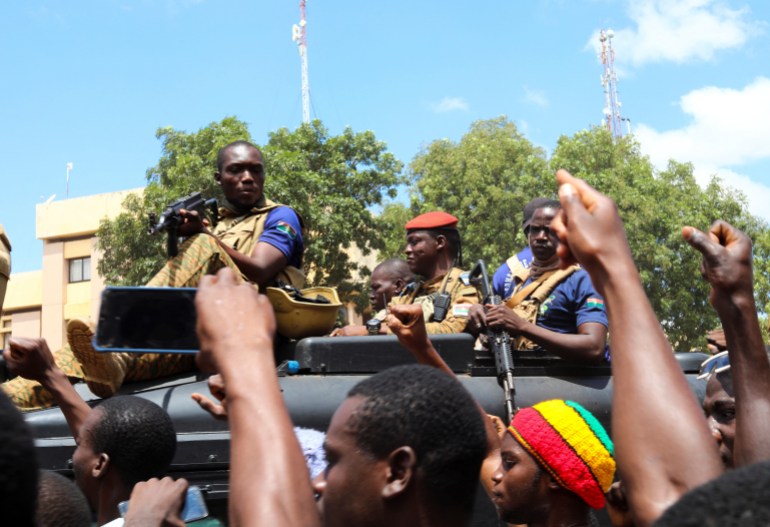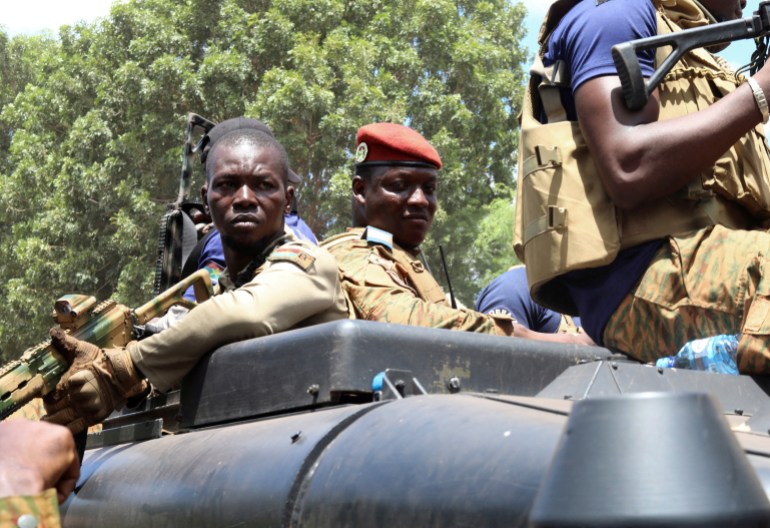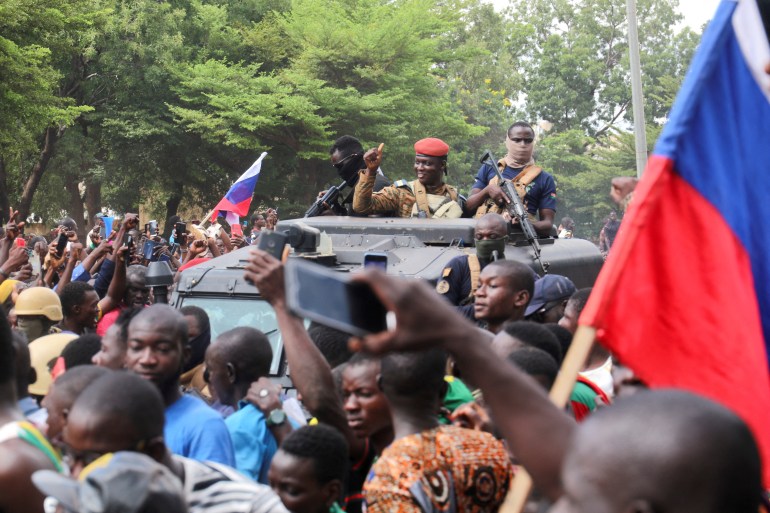Why Burkina Faso just had its second coup in 8 months
34-year-old Army captain Ibrahim Traore is Burkina Faso’s new leader.

On September 30, Captain Ibrahim Traore led a coup to become Burkina Faso’s new leader, deposing Paul Henri-Damiba, who had only come to power in January through his own coup. So, what are the conditions that allowed for the West African nation to face two coups in just eight months?
Keep reading
list of 4 itemsHow Formula 1 is stepping out on the world stage
After hurricanes, when to rebuild and when to retreat
The Russians fleeing Putin’s military draft
In this episode:
- Nicolas Haque, (@nicolashaque), Al Jazeera’s West Africa correspondent
Connect with us:
@AJEPodcasts on Twitter, Instagram, and Facebook
Full episode transcript:
This transcript was created using AI. It’s been reviewed by humans, but it might contain errors. Please let us know if you have any corrections or questions, our email is TheTake@aljazeera.net.
Newsreel: We’re going to start with breaking news from Burkina Faso, where the army has seized control of the country.
Halla Mohieddeen: A coup in Burkina Faso. You might find yourself thinking, “Didn’t that happen already this year?” That’s because it did, in January.
Newsreel: In Burkina Faso’s capital Ouagadougou. People reported hearing the sound of heavy and sustained gunfire.
Halla Mohieddeen: But at the end of last month, it happened again.
Newsreel: In the red beret, Captain Ibrahim Traore, Burkina Faso’s new junta leader and self appointed president. Thousands gathered in the capital and what seemed like a victory parade.
Halla Mohieddeen: So what are the conditions that have led to two coups in eight months? I’m Halla Mohieddeen, and this is the Take.
[THEME MUSIC PLAYING]
Halla Mohieddeen: At the end of last month, Ibrahim Traore, an unknown 34-year-old army captain, led a coup to oust Burkina Faso’s President Paul-Henri Damiba. Damiba had only been in power since January when he himself led a coup to become the country’s leader.
Newsreel: Another coup in Burkina Faso. Residents woke to the sound of gunfire. Soldiers took positions on the capitol’s main artery.
Newsreel: The military has named coup leader Lieutenant-Colonel Paul-Henri Sandaogo Damiba interim president.
Halla Mohieddeen: From the outside looking in, two coups in such a short space of time might seem hard to comprehend. But according to Al Jazeera’s Nicolas Haque, who’s been covering West Africa for almost a decade, for the Burkinabe people, it was a bit more predictable.
Nicolas Haque: What happened on September 30th may have come as a surprise to most of the world, but perhaps not for people inside Burkina Faso. There was gunfire that erupted in the middle of the night outside the presidential palace. Usually when that happens, people wake up, they start calling each other. But there was this eerie calm in the capital, Ouagadougou, a sense of deja vu.
Halla Mohieddeen: At the heart of Burkina Faso’s instability is its security crisis in the north of the country, where armed rebel groups affiliated with al-Qaeda and ISIL (ISIS) have taken root since 2015.
Newsreel: Breaking news out of Burkina Faso, where one of the biggest massacres in years has been committed.
Newsreel: This is what’s left of the once bustling village of Solhan, a group of armed men attacked, shooting people and burning down their homes.

[MUSIC PLAYING]
Halla Mohieddeen: Violence attributed to the fighters has displaced two million people and killed thousands. Earlier this year, an official for ECOWAS, the Economic Community of West African States, said the state in Burkina Faso only has control of 60 percent of the country. Yacouba, a local in Ouagadougou, told us it’s a situation that’s constantly on the minds of the Burkinabe people.
Yacouba: The security situation in Burkina Faso is not improving at all. We have been facing terrorism for the past seven years. And for these past seven years, we have been struggling. The army has been struggling. The citizens of Burkina Faso have been struggling, but so far nothing is improving. Internal displaced people, they are not returning to their homes. They are not returning to their villages. And it is not improving because daily people are being killed.
Halla Mohieddeen: The discontent over the state’s inability to deal with the fighters in the north isn’t limited to the general population, but within the military, as well. A growing frustration has mounted in the military ranks about the defeats they’re suffering to the rebels. And a feeling for some like the country’s new President Ibrahim Traore, that they can do better. I asked Nic about Burkina Faso’s new leader
[MUSIC PLAYING]
Nicolas Haque: Captain Ibrahim Traore, is in his 30s. So you have to bear in mind that he has experienced for his entire life, the rule of Blaise Compoare who was also a military soldier that took over in a coup. Traore joined the army and he was then specialised into a special unit that was created to fight armed groups linked to ISIL and al-Qaeda. He was, until the coup, posted in a city called Kaya, which I’ve travelled to. Kaya is home to people displaced because of the violence of armed conflict. So we’re talking about two million people are displaced. The vast majority are in this town of Kaya. So Captain Traore has over the years seen the influx of people coming in. Mostly children are refugees in this country. And there’s been attacks around the vicinity of Kaya where Captain Traore has had to come into action. And that gives you a premise of what Traore is all about.
Halla Mohieddeen: And what about democratic institutions in Burkina Faso? I mean, we’re talking about coup after coup after coup here. Are these democratic institutions fundamentally broken?
[MUSIC PLAYING]
Nicolas Haque: What we have to remember is the context in which democracy arised in these countries. Not just Burkina Faso, but all other countries in the region where there’s been coups. Now, these countries have all one thing in common, Halla. They’re all former French colonies, and they all have a French military base. And despite the presence of the French military, these coups keep on happening, which suggests to the population that sometimes, rightly or wrongly, the French are involved, are meddling into the country’s affair.
And these countries that had peaceful independence, you know, there was no war of independence against France. All have had this almost like copy-pasted. constitution of France. And put them in an African context. And at the root of why there’s dysfunctioning democracies in the region is this key issue. Are the constitutions or the democratic institutions that were copy and pasted or imported from France, do they function in a West African or a Burkinabe society? It seems not.
Halla Mohieddeen: The relationship between Burkina Faso and France is complicated, steeped in colonialism. Anti-French sentiment has been very visible in recent years. Something French President Emmanuel Macron has tried to tackle since his election in 2017.
Nicolas Haque: That was a really pivotal time, a change of French policy towards Africa. And his first visit was Burkina Faso. And he went there not to meet the president per se, but to have a town hall meeting with young students from the University in Burkina Faso. I mean, an incredible moment that you would’ve never imagined
Emmanuel Macron (translated from French): I am like you from a generation that never knew Africa as a colonised continent. I am from a generation for whom one of the great political memories was the victory of Nelson Mandela. This is the history of our generation.
Nicolas Haque: Here’s a young president Macron, who’s about my age, who doesn’t have the whole history of colonialism behind, who’s a break from the past.
Halla Mohieddeen: So have people warmed to Macron in Burkina Faso? I mean, because you, you get the sense there’s very much an anti-French sort of sentiment.
Nicolas Haque: I think that Macron opened the door for a different dialogue and young people just walked in and made their demands. And Macron did things that no other French presidents have done before, like open a commission to rethink the relationship with France. And, and so he opened the door to a broader discussion, to criticism. He did these talks last year in Montpelier where he invited young people to come and have a go at him.

[MUSIC PLAYING]
Halla Mohieddeen: Macron’s efforts, however, haven’t paid off. After the break, we’ll look at why Burkina Faso might be snubbing France and turning to Russia instead.
[THEME MUSIC PLAYING]
Halla Mohieddeen: There is historical baggage with France, but it also looks like there’s a couple of other major players who are looking for influence. Shall we say in West Africa particularly in Burkina Faso. And I’m talking mainly about Russia, they have been making that play for influence in Burkina Faso, and many are welcoming Russia with open arms, aren’t they? Can you just talk to us a little bit about that dynamic?
Nicolas Haque: I mean, it is astonishing for me to see Macron, a couple of years ago, people waving French flags when he came in town. You know, when they saw the French special forces or the French military, people were waving French flags, and now people have, like, almost turned that flag upside down to turn it into a Russian flag.
Protester: We don’t want no more France. We’re here because we need the defence of Russia. France haven’t do anything who has give us success
Nicolas Haque: Literally, the stripes have changed from vertical to horizontal. And we’re seeing people waving the Russian flag. And I’ve seen this in Mali and now in Burkina Faso.
Halla Mohieddeen: So even though Macron did all these things in terms of outreach, people still seem a bit more excited about Russia. Is that fair?
Nicolas Haque: Well, yeah, because Russia doesn’t have the loaded colonial past. It doesn’t have the military base on the ground. It doesn’t have the history. And it’s really interesting in Russian propaganda movies that target an African audience. They don’t even mention France. They know that’s just a won cause. There’s also active people on social media that are really fermenting this anti-French sentiment throughout French speaking Africa.
[MUSIC PLAYING]
Halla Mohieddeen: At the heart of Russia’s efforts to gain a foothold in West Africa is an organisation shrouded in secrecy. The Wagner Group, run by a close ally of Russian President Vladimir Putin, is a group of mercenaries who provide fighters and military training to foreign countries.
Nicolas Haque: You can’t talk about Russian foreign policy in Africa without talking about the Wagner group. Now, Wagner first were active in Sudan, and then were active in the Central African Republic. I went in with a team and we saw Russian fighters training the Central African Army.
Newsreel: The soldiers work for the government here. So does the man training them. Soldier should know how to approach the object, the installation.
Nicolas Haque: And we met the special adviser to the president, President Touadera. His name was Valery Zakharov. And he told me straight off, I told him, What’s your interest here? He said, Russia is back in Africa.
Valeri Zakharov: [speaking in Russian].
Nicolas Haque: And that gives you the tone of what it’s all about. The model of Wagner is that they come into countries where they are rich in minerals and resources. So the Central African Republic is rich in diamonds and gold. Burkina Faso is a country that is rich in minerals, and the Wagner Group has been trying to get in and to help the government there, but have not managed to do so, at least until now. Wagner only acts in countries where there is the interest of Russia.
Halla Mohieddeen: Right.
Nicolas Haque: On a geopolitical front.
[MUSIC PLAYING]
Halla Mohieddeen: Why would Burkina Faso gravitate towards Russia? We know what’s in it for Russia. What’s in it for Burkina Faso?
Nicolas Haque: I think the army of Burkina Faso are looking for any other alternative to France as a partner. And what’s interesting is that Wagner does multiple operations, right? It provides soldiers, fighters on the ground. It extracts from mines, but it also has a key component on social media. It also does these productions. They also do these social media videos on TikTok, making war fun, trying to attract young African soldiers.
[SOUNDS OF TIKTOKS]
Nicolas Haque: It’s a multifaceted operation that’s very useful to Vladimir Putin right now. Because if he can get these countries’ support in the short run and in the long run, that gives Russia and Vladimir Putin a lot more sway on the ground. The more countries that support him, especially given the situation in Europe, the better it is for him. So as Abdoulaye Diop, the foreign minister of Mali, told me once, it’s a win-win situation for the Russians and for these countries in the Sahel.
Halla Mohieddeen: But while France and Russia jockey for influence, it’s the groups tied to ISIL and al-Qaeda that have taken control of large parts of the north of Burkina Faso. Something Nic says is getting lost in a lot of the coverage about the country.

[MUSIC PLAYING]
Nicolas Haque: Abu Bakr al-Baghdadi, the leader of ISIL before his death when he saw the territory being destroyed in Syria and in Iraq, had said that they will regroup in Africa. And it’s happening. It’s happening now, and it’s happening out of sight, and it’s happening quickly. The fighters from ISIL and al-Qaeda are made up of local nationals, people from Burkina Faso, from Mali, from Niger. There are people from Nigeria, from the local area, but it is an international, global organisation that has control over vast swath land, in the tri-border area of Burkina Faso, Niger and Mali. Just the last two years has been incredible to see how much they’ve gained and how brazen their attacks have been. Right now, they’re holding a siege over the town of Djibo. Now, most people in the world have never heard of the town of Djibo.
Newsreel: The extremists have reportedly cut off access, and they’re also stopping residents from leaving the town that is also the capital of the Soum province.
Nicolas Haque: It’s a town of 350,000 people. Some of them who are said to be dying of hunger. The situation is absolutely dire. No one can get access to this area. It’s not as if it’s happening in Syria, close to Turkey. It has a strong link to the West. No, no one is seeing the absolute disaster and humanitarian catastrophe unfolding in the Sahel right now. And these groups are launching attacks further and further towards the coast of West Africa. We’ve seen attacks in Togo, Benin, Ivory Coast. Make no mistake, their ambition is to gain grounds. It’s to come closer and closer to the capital, Ouagadougou.
Halla Mohieddeen: Do you think Burkina Faso is equipped to deal with ISIL?
Nicolas Haque: Absolutely not. I think that we’ve perhaps underestimated how savvy and smart, the local fighters from al-Qaeda and ISIL are. There’s been a terrible drought last year, and so much of this conflict, Halla, is driven by the fact that the weather in the Sahel is changing and that people are not able to feed their families. Armed groups control the wells and the water points. And they’re bouncing off the absence of the state, the state that hasn’t brought water, the state that hasn’t brought electricity, the state that has forgotten large parts of their population.
Halla Mohieddeen: So what’s the plan here?
Nicolas Haque: The young captain and now the president of Burkina Faso, Ibrahim Traore he’s got a lot of pressure on him. He’s been on the front line. He knows what he’s up against. And that’s why there’s a level of desperation to try to seek alternatives from France.
Halla Mohieddeen: If the military in Burkina Faso is still suffering these sorts of defeats, if it’s still gonna keep losing territory to ISIL, how sustainable is this for this new government who, let’s not forget, is led by an inexperienced captain who’s in his 30s? I mean, are we looking at another coup in a few months time?
Nicolas Haque: The dangers in Burkina Faso is internal fighting. The main challenge for Captain Traore is to unite the army, but also unite the people and to heal the divisions and to rebuild trust. Trust is broken. Within the military, trust is broken between soldiers and the civilians that they’re meant to protect. Trust is broken between the state and its major military support and ally France so rebuilding that trust is going to be a major challenge. And this feeling among other soldiers, if this captain can do it, why not me? Right now when they’re going to be seeing young Captain Ibrahim Traore in the palace, there’ll be a desire, and some of them will be wondering, Why not me? Chances of a coup again, is highly likely, but chances of greater instability is even more likely.
Halla Mohieddeen: And that’s the Take. This episode was produced by Ashish Malhotra with Negin Owliaei, Ruby Zaman, Amy Walters, Chloe K. Li, Alexandra Locke, and me, Halla Mohieddeen. Alex Roldan is our sound designer. Tim St. Clair mixed this episode. Aya Elmileik and Adam Abou-Gad are the Take’s engagement producers. And Ney Alvarez is Al Jazeera’s head of audio. We’ll be back on Friday.
Episode credits:
This episode was produced by Ashish Malhotra with Amy Walters, Negin Owliaei, Ruby Zaman, Chloe K. Li, Alexandra Locke, and Halla Mohieddeen. Alex Roldan is our sound designer. Tim St. Clair mixed this episode.
Aya Elmileik and Adam Abou-Gad are our engagement producers. Ney Alvarez is Al Jazeera’s head of audio.